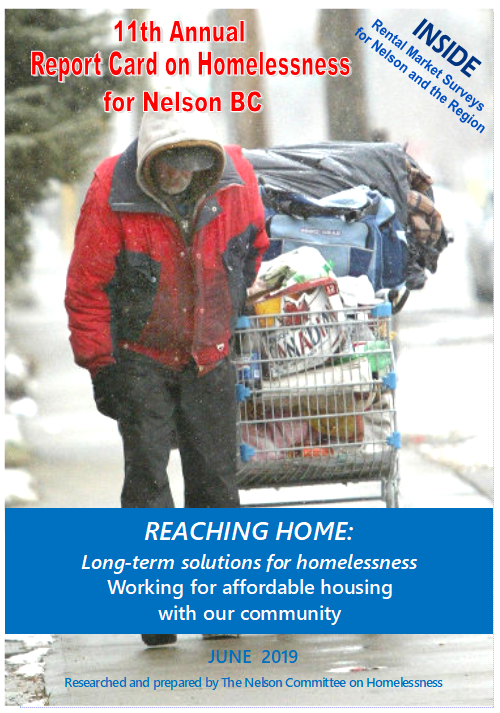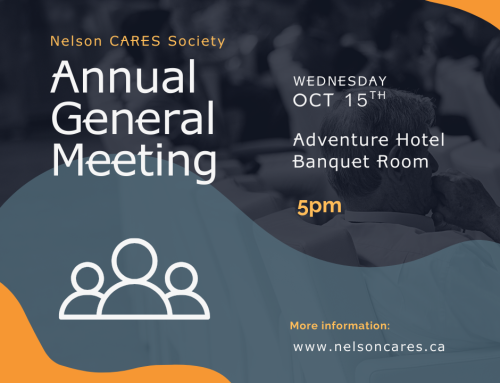COMMITTEE CALLS FOR MORE AFFORDABLE RENTAL HOUSING IN NELSON:
A RANGE OF SUPPORTIVE HOUSING OPTIONS ALSO CALLED FOR AS A MISSING LINK
TO HELP PREVENT HOMELESSNESS
Continuing 0% vacancy rates for a fifth year in a row in Nelson and high rental rates compared to per capita incomes of renters PLUS a lack of and decrease in purpose-built rental housing stock in Nelson have the Nelson Committee on Homelessness (NCOH) calling for more affordable rental housing in Nelson.
NCOH released it’s 11th Annual Report Card on Homelessness today. Every year it tracks community indicators that have an impact on homelessness and poverty in Nelson.
“Even with the new housing projects coming on stream, it doesn’t keep up with the affordable units that have been lost in Nelson over the past number of years,” said Ann Harvey, Community Coordinator for NCOH. The affordable housing crisis in BC has hit many households hard, but those on fixed incomes and very low incomes are hit the hardest.
Coupled with these hard facts is the growing complexity of issues being faced by many of those experiencing homelessness.
Agencies serving youth populations are seeing youth showing up exhibiting more complex needs. NCOH’s survey of people of all ages without housing last year showed that 56% of them had first experienced homelessness before they were the age of 19. LGBTQ2S+, transgender and Indigenous youth are over-represented among Nelson’s homeless population. Many leave home when individual and family problems become overwhelming. Some flee trauma, abuse and discrimination. Services are now reporting the use of crystal meth at younger ages – which contributes to increased mental health issues, addictions, victimization and exploitation of youth.
All ages and household make-ups are feeling the housing crunch and the pressure that higher costs put on families and individuals. Services report seeing more seniors at risk and homeless in the community. When leases end, or traditional rental buildings change hands or are renovated, long-time senior renters find themselves hard-pressed to find rental housing at a price they were paying in established rent-controlled units.
Affordable housing is defined by Canada Mortgage and Housing Corporation as affording rent and utilities at 30% of gross household income.
“There are the rent-controlled purpose-built rental buildings which are wonderful,” says Harvey. “But if someone needs to find an advertised rental unit, they will be shocked to see average advertised rental rates 39% to 55% higher than their established long-term rentals, depending on the unit size.” NCOH surveyed 174 rental ads in April and May for Nelson. “You either need to know someone who knows someone, or you are looking elsewhere for housing,” said Harvey.
The other growing option is to share housing. This can lead to precarious housing situations and reduced security of tenure. As well, 30% of the 360 people who WERE housed surveyed in the homeless count last year indicated they were at imminent risk of losing their housing, primarily for financial reasons or leases ending. Shared living was by far the most advertised in this year’s advertised rentals survey by NCOH.
Women and children fleeing violence, often with no or few resources accessible to them upon leaving, are also finding it difficult. The Aimee Beaulieu Transition House had great difficulty finding the housing supports their clients needed after their 30 day stay this past year, with some needing to stay much longer as options were searched for.
The opioid crisis has hit all of BC and Nelson is no exception. Nelson’s Fentanyl Task Force, ANKORS, Mental Health and Substance Use services of Interior Health, Street Outreach and other community services are all working hard to keep people safe and offer information, treatment and other harm reduction options. It adds to the complexities of people’s health needs and mental health, when they are homeless.
Nelson identified 20 people last year living without any housing or shelter in it’s Point in Time Count. Another will be conducted in April 2020. Of the 101 people without safe, permanent housing surveyed last year, 39% who were experiencing some type of homelessness had been without stable, safe, permanent housing for over 6 months that year – whether “roughing it”, among the hidden homeless who were couch surfing, staying at the shelter or in transitional or institutional housing with no home to return to.
REACHING HOME:
NCOH is just starting into five years of a new 10-year federal program – Reaching Home – that hopes to make a change in the lives of the most chronic and vulnerable homeless and at risk populations, and to the life of our community.
Beginning with a community planning process to pull in all stakeholders and set goals, NCOH is hoping to work towards a more coordinated “systems” approach among service providers in the community and in government. Over three years the goal is to utilize resources more efficiently through increased coordination using such things as common vulnerable assessment tools, coordinating access to services, and through sharing data and a more coordinated case management approach.
This is all to streamline the process for people experiencing homelessness to access the type of housing and support services they need to permanently end their homelessness.
Key to the success of Reaching Home will be the provision of supportive housing, offer 24/7 staffing, a meal program, supports to help people maintain their residency, improve their health and learn/re-learn life skills to help in community re-inclusion. Connecting residents to community services and supports, case planning and help to access income, ID, establish a bank account etc. is also be offered, and on-site medical supports is also an option.
“This is really the missing link for Nelson right now,” said Harvey. It’s hard to prevent homelessness and move people out of homelessness when the necessary supports aren’t there. This type of housing has a proven track-record in many communities across Canada and the globe. It really does help improve individuals’ health and lives… and the health and life of the community.”
NCOH participants are also working on a range of housing options for youth – from a growing need expressed for emergency housing for youth of our community and more supported housing options for them – to second stage housing for women and children fleeing violence – and more affordable housing and supported housing for seniors.
Some of the community rental housing need and some affordable housing need will be met with the three new rental housing projects under development – Nelson CARES Hall Street project (43 units), Lakeside Place project (47 units) and SHARE Nelson’s project (39 units).
For a copy of the full report, click here.
-30-
For more information and contacts for NCOH Chairs and service agencies, please contact:
Ann Harvey, Community Coordinator
250-352-6011 x5
ncoh@nelsoncares.ca





